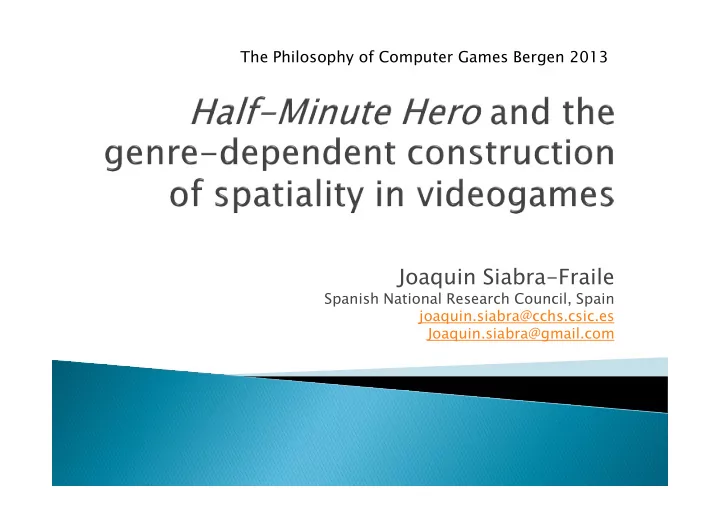

The Philosophy of Computer Games Bergen 2013 Joaquin Siabra-Fraile Spanish National Research Council, Spain joaquin.siabra@cchs.csic.es Joaquin.siabra@gmail.com
The Philosophy of Computer Games Bergen 2013 � Interactivity of videogames � A videogame does not simulate things , but the laws that rule the behaviour of things (Frasca 2003:2-4) � Virtual world: the simulation or implementation of a set of rules for the behaviour of objects � So a videogame is a kind of virtual world.
The Philosophy of Computer Games Bergen 2013 � Virtual world: both the goal and the result of the actions may be external to the virtual world. Example: Facebook � Videogame: both the goal and the result of the actions are internal to the virtual world. Example: Hitman: Blood Money.
The Philosophy of Computer Games Bergen 2013 � What is, then, an object within a virtual world? Object: everything that works as condition for something else � Concept of object in Wittgenstein � Possibility of interrelation of objects in the virtual world = possibility of actions in the virtual world.
The Philosophy of Computer Games Bergen 2013 � Pragmatic net of objects and meaning � Meaning and goals � Goals and immersion
The Philosophy of Computer Games Bergen 2013 � Genres = outlines of logical spaces � When it is said of a videogame that it is of some genre, the gamer is being told what kind of world is going to find or, in terms of immersion-incorporation, what kind of things the gamer will be able to do . Example: bottle in Lost in Blue or in Manhunt � Genres are historical conventions consolidated by use ( not deducible from a principle)
The Philosophy of Computer Games Bergen 2013 � Videogame, as a virtual world, is a set of rules of dependency between objects. � The representation of these objects is subject to the rules of dependency between objects (representation is virtualised) � So in a videogame the physical space depends on the logical space upon which the virtual world is constructed. � The Problem: the logical space is a kind of ontology, the physical space defines extensions.
The Philosophy of Computer Games Bergen 2013 � A relational theory of space: Leibniz (Clarke-Leibniz 1717: Leibniz´s Fith Paper, §47). � Situation , Place and Space � physical space in videogames = the set of representations constructed from specific situations of objects, which situations are adjusted to a general model of conditions between objects. � physical space in videogames is always logically qualified by that which can o cannot be done
The Philosophy of Computer Games Bergen 2013 � If logical space determines physical space, � And logical spaces are defined according to certain genres or combination of genres, � Then the physical spaces are generically determined.
The Philosophy of Computer Games Bergen 2013 Figure 1. Representation of a physical space “ P ” . Source: Half-Minute Hero, Marvellous Entertainment PSP, 2009
The Philosophy of Computer Games Bergen 2013 Figure 2. Qualified space A of P (simplified) if there is no object “ ship ” . White; Inaccessible space. Green: accessible space with low level enemies. Yellow: space with high level enemies. Blue: links to cities or end boss. The brown circle is the character. Source: prepared by the author based on the figure 1.
The Philosophy of Computer Games Bergen 2013 Figure 3. Qualified space B of P when we sail on a ship. White: inaccessible space. Blue: the harbour (switcher between A and B ). Red: space we can move through. Source: prepared by the author based on the figure 1.
The Philosophy of Computer Games Bergen 2013 � Role-playing video game: Hero 30 Mode Source: Half-Minute Hero, Marvellous Entertainment PSP, 2009
The Philosophy of Computer Games Bergen 2013 � Real-time strategy game: Evil Lord 30 Mode Source: Half-Minute Hero, Marvellous Entertainment PSP, 2009
The Philosophy of Computer Games Bergen 2013 � Shoot 'em up game: Princess 30 Mode Source: Half-Minute Hero, Marvellous Entertainment PSP, 2009
The Philosophy of Computer Games Bergen 2013 � Hack-and-slash game: Knight 30 Mode Source: Half-Minute Hero, Marvellous Entertainment PSP, 2009
The Philosophy of Computer Games Bergen 2013 � Hub mode
The Philosophy of Computer Games Bergen 2013 [A1]: videogame as a kind of virtual world (=a net of objects or logical space of � conditions characterised by its function or rules of use). A criticism should explain how the interactivity without an autonomy of the rules (implementable by means of a Turing Machine) is possible [A2]: generic outlines of such nets of objects/rules of use or logical space of � conditions = genres of videogames A criticism should account for the different meanings of the objects in, for example, a platform game in relation to an RPG [B]: the physical space is constructed upon the rules of that logical space: because � the logical space is established in the shape of diverse genres, so the physical space, dependent on the logical space, will be established dependent on the genres. A counterexample could be an alternative theoretical mechanism by which the physical distance in a videogame is independent from the set of goals (established with and from the existing objects, in accordance with one or various genres) [C]: RPG, Shoot ’ em, RTS and Hack-and-slash games from the analysis of Half- � Minute Hero Criticisms to the specific characterisations of each genre are possible without affecting [A1], [A2] or [B].
The Philosophy of Computer Games Bergen 2013 Joaquin Siabra-Fraile Spanish National Research Council, Spain joaquin.siabra@cchs.csic.es Joaquin.siabra@gmail.com
Recommend
More recommend